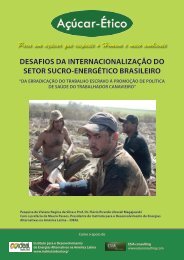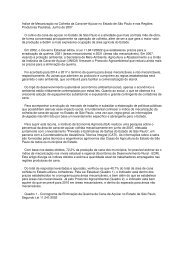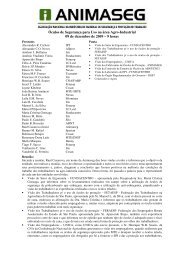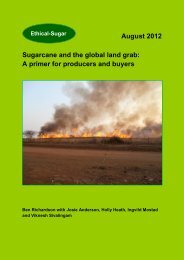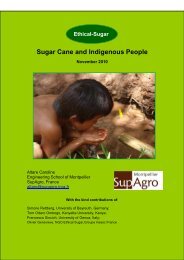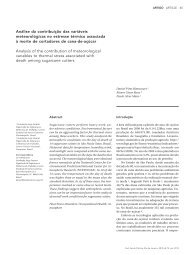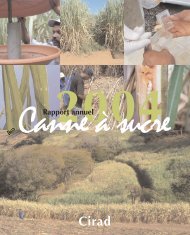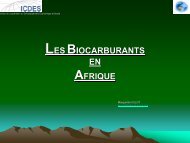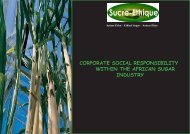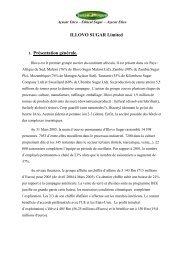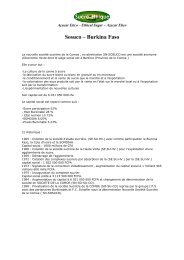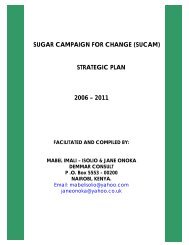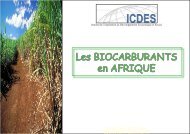Status report on sugar cane agrochemicals ... - Sucre Ethique
Status report on sugar cane agrochemicals ... - Sucre Ethique
Status report on sugar cane agrochemicals ... - Sucre Ethique
Create successful ePaper yourself
Turn your PDF publications into a flip-book with our unique Google optimized e-Paper software.
25<br />
Examples of inappropriate use of<br />
<strong>agrochemicals</strong><br />
Nicaragua : Chr<strong>on</strong>ic kidney failure (CKF) and agreochemical used in <strong>sugar</strong><strong>cane</strong> � elds<br />
In Nicaragua, the San Ant<strong>on</strong>io <strong>sugar</strong> mill, owned by the Nicaragua Sugar Estates Ltd., has been<br />
brought to justice for having caused the premature death of thousands of <strong>sugar</strong><strong>cane</strong> harvest<br />
workers, due to the wr<strong>on</strong>gful or negligent use of di� erent herbicides and pesticides. The Chr<strong>on</strong>ic<br />
Renal Insu� ciency (CRI), presumably induced by <strong>agrochemicals</strong> exposure, has been pointed out<br />
as the death cause. Informati<strong>on</strong> from the Nicaraguan associati<strong>on</strong> set up to defend the rights of the<br />
people su� ering from the disease (Asociación Nicaragüense de Afectados por Insu� ciencia Renal<br />
Crónica – ANAIRC), an a� liate of the Internati<strong>on</strong>al Uni<strong>on</strong> of Food, Agricultural, Hotel, Restaurant,<br />
Catering, Tobacco and Allied Workers’ Associati<strong>on</strong>s (IUF), <str<strong>on</strong>g>report</str<strong>on</strong>g>s that the total number of people<br />
who have died as a result of Chr<strong>on</strong>ic Renal Insu� ciency (CRI) as of March 22, 2009 was 3,251, and<br />
that from March 14, 2005 to March 22, 2009 al<strong>on</strong>e, 2,244 people died from this disease. (ANAIRC<br />
2009)<br />
In additi<strong>on</strong> to the deaths, thousands of harvest workers are currently a� icted with CRI, allegedly<br />
because of pesticide exposure. The disease entails a gradual and progressive loss of the ability of<br />
the kidneys to excrete wastes, c<strong>on</strong>centrate urine, and c<strong>on</strong>serve electrolytes. This process usually<br />
lasts several years, during which the internal structures of the kidney are slowly damaged. The<br />
victims have been usually been diagnosed at a stage at which it would be too late to c<strong>on</strong>duct a<br />
kidney transplant. Moreover, the diseased are usually poor, and live in a rural area, therefore lacking<br />
the opportunity to receive dialysis treatment. Moreover, a signi� cant amount of workers have,<br />
presumably wr<strong>on</strong>gfully, been denied their disability pensi<strong>on</strong> bene� ts essential for their own and<br />
their families’ survival. (IJM 2007)<br />
The list of the chemicals used in the � elds and suspected for having caused the illness include the<br />
herbicides Glyphosate (RoundUp), Hexazin<strong>on</strong>e, Ametryn, Karmex DF, Paraquat (Gramox<strong>on</strong>e), the<br />
rodenticide Warfarin, and the insecticides Terbufos and Cypermethrin (IJM 2007).<br />
San Ant<strong>on</strong>io is a nati<strong>on</strong>al company, which produces almost all of the <strong>sugar</strong> c<strong>on</strong>sumed in Nicaragua,<br />
and also exports both <strong>sugar</strong> and <strong>sugar</strong><strong>cane</strong> ethanol, both to Europe and the US. (Iglesias<br />
2009; Frey 2008). The company has been accused of c<strong>on</strong>cealing informati<strong>on</strong> about the use of <strong>agrochemicals</strong><br />
in its exploitati<strong>on</strong>s, and for violating Nicaraguan labour legislati<strong>on</strong> (Frey 2008). The associati<strong>on</strong><br />
set up to defend the rights of the victims, ANAIRC (Asociación Nicaragüense de Afectados<br />
por Insu� ciencia Renal Crónica), has organised a number of dem<strong>on</strong>strati<strong>on</strong>s, but have also � led<br />
several lawsuits against the company. However, the police and the authorities have sought to<br />
prevent farmers from dem<strong>on</strong>strating, and the lawsuits have failed to produce results favourable to<br />
the victims, and the police has been accused of violently repressing the protests.<br />
The case is complicated by the fact that Carlos Pellas, the President of Nicaragua Sugar Estates,<br />
is <strong>on</strong>e of the richest and most in� uential men in Nicaragua, with close c<strong>on</strong>tacts with the country’s<br />
political elite. Moreover, Pellas and his wife are major philanthropists and therefore popular<br />
� gures in the country’s political life. Thanks to his central positi<strong>on</strong> in networks of power, and his<br />
<str<strong>on</strong>g>Status</str<strong>on</strong>g> <str<strong>on</strong>g>report</str<strong>on</strong>g> <strong>on</strong> <strong>sugar</strong> <strong>cane</strong><br />
<strong>agrochemicals</strong> management<br />
-<br />
ETHICAL-SUGAR




